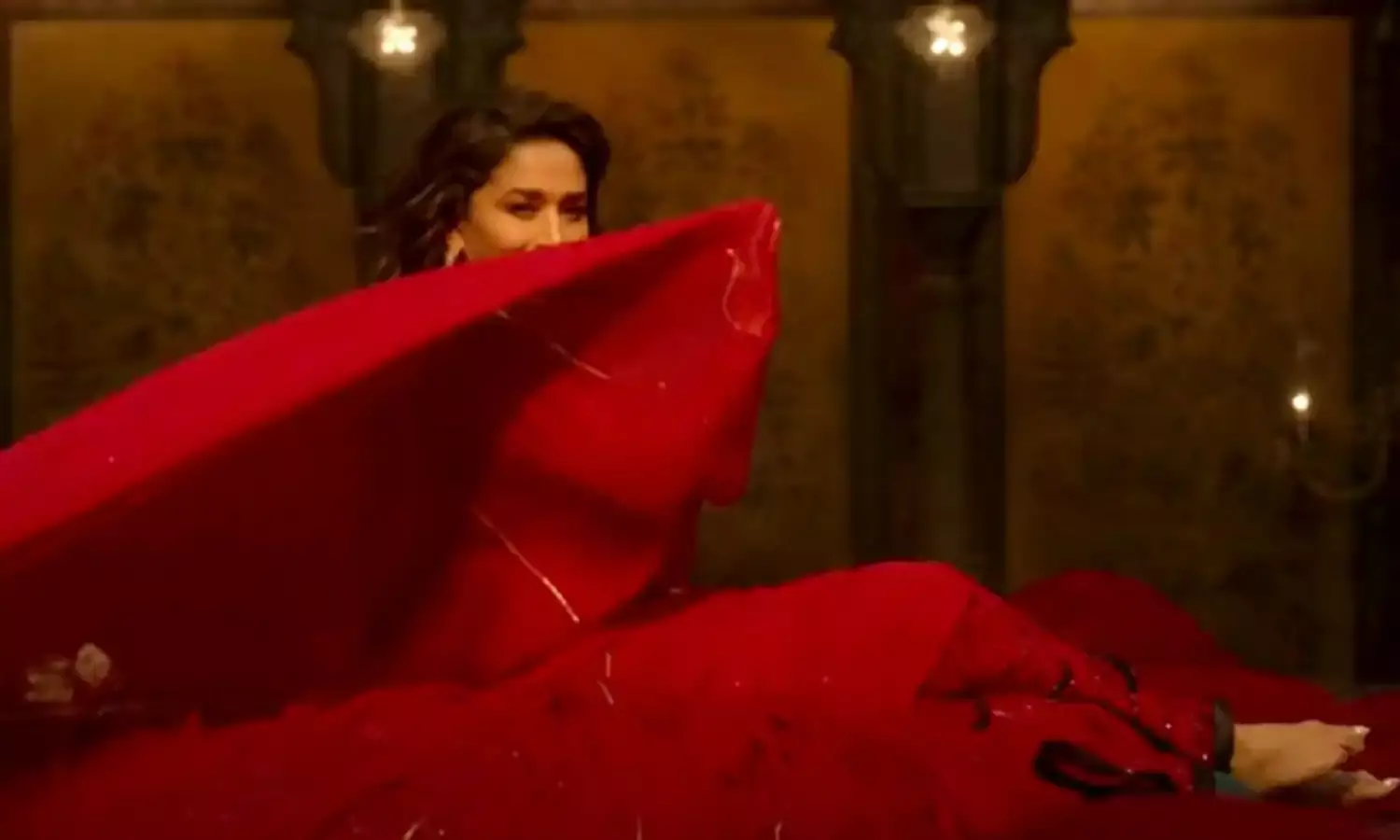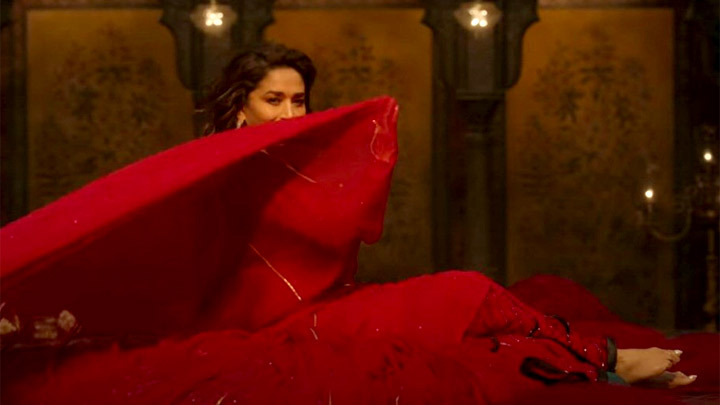The Fame Game - Too Many Loose Strings
FILM REVIEW

What do films like Sone Ki Chidiya (1958) directed by Shaheed Latif, Aji Bas Sukriya (1958) directed by Shaheed Latif, Dirty Picture (2011) directed by Milan Luthra, Heroine (2012) directed by Madhur Bhandarkar, Fan (2016) directed by Maneesh Sharma and The Fame Game (2022) released on NETFLIX have in common?
They bring the life and struggles of a film star alive on celluloid based majorly on fiction. They carry with them the rather heavy baggage of the entire film industry which includes the members of the exploitative family of the star living off where she feels trapped but does nothing to come out of it. The film has been conceptualized by Sri Rao and directed by Bejoy Nambiar and Karishma Kohli
Madhuri Dixit, on the face of it, decided to jump piggy-back on the carefully cultivated glamour and chutzpah she has created and sustained for several decades. So, she gets under the skin of the numero uno Anamika Anand who comes back to star as the leading lady in a new, lavishly mounted film after a gap of twenty years.
The film is going to be produced by her husband Nikhil (Sanjay Kapoor) and she is paired with her old flame matinee idol Maneesh Khanna (Manav Kaul) who shared a personal chemistry but could not marry because of Anamika’s extremely dominating and dictatorial mother (Suhasini Mulay) Nikhil knows about the romance but his business instincts make him persuade Maneesh to agree to act opposite his wife Anamika. Maneesh agrees at once and just when the cameras are about to roll, Anamika goes missing.
No one could have suited the character better than Ms. Dixit. Today, she is the mother of two grown children she dotes on but the children are marginalised by the larger-than-life image of their star mother, specially, the son and they seem distinctly uncomfortable with the media hype showered on them.
The daughter wants to become a star like her mother but her looks are nowhere near her beautiful mother and she is aware of this reality. She gets romantically involved with a young man who is not only a crazy fan of Anamika but later, also claims to be her illegitimate son born of her affair with Maneesh when they had gone location shooting in London. This link is left unexplained and is left as a crazy fan (Gagan Arora).
When Anamika arranges the young man to be bashed up critically by her confidante make-up man, this shows a dent in the lily-pure, martyr-like image Anamika showing to what lengths she can go to protect her image though here, it is emphasized again and again as “family” which, under the veneer of seeming affluence, happiness and love, has many cracks beneath the smooth exterior.
The film opens on the very gaudily dressed Anamika captured from the back at a crowded gathering. Can any star in India carry the madness and fandom for 20 long years without competition from younger actors? In fact, the film industry is hardly visible throughout the film. There is a brief glimpse of a wannabe star in the beginning of the film who later becomes a big star as her posters reveal but otherwise, no sign of the film world other than Maneesh and Anamika hersef.
The story gathers solid momentum when Anamika goes missing. Has she been abducted? Not really as there is no ransom demand. Has she walked out of her life tailored, designed and dominated directly by her mother and indirectly by her husband who has invested his wife’s earnings that threatens even the mansion they live in?
Has she walked out of her marriage to begin a new life with Maneesh who is persuading her to walk out of her exploited life and make a new beginning with him? This becomes the spine of the narrative which slowly and steadily becomes weak as the narrative moves along because of too many clues that are hardly backed either by logic or my intrigue.
Cinema is based on a play between onscreen and offscreen space, a dialectic between withholding and revealing visual information, between restricting our vision and expanding it. Cinema creates blind spots. It has now-you-see-it-now-you-don’t quality. These properties link cinema to the basic principle of both suspense and the labyrinth, which are similarly based on withholding and revealing, showing us only so much, blocking our vision in order to intensify our awareness and anticipation of what we cannot see.
Standing at the centre of this hide-and-seek play around search for the missing star is a lesbian cop (Rajshri Deshpande), who begins investigating her disappearance is surprised with the skeletons that pop out from every closet of the celebrity breadwinner's seemingly perfect family.
The fleshing out of her lesbian character is treated with extreme subtlety married to reality empowered by a fine performance. She finally solves the missing-star mystery but is taken off the case at the final moment by her boss who ridicules her because of her comparison between Anamika’s missing and a scene from an old film of hers.
Gagan Arora as her crazy fan is very good with his naivete and freshness but his back story is left completely unexplored as is the murder of Anamika’s close confidante make-up man. Dr. Sanjay Chugh, Senior Consultant Psychologist, Delhi, says, “The word 'Fan' is a short form of the word 'Fanatic', which refers to someone getting driven to frenzy due to his devotion to a deity. We all have had our fan moments and we all have some icon or role model whom we look up to. It’s absolutely normal for a fan to read up about his idol, follow news items related to him or her, collect pictures, autographs and other memorabilia, and feel excited about the idol. However, when it begins to cross the line and enter into the terrain of imbalance and pathology, one needs to pull in the reins.”
Anamika takes care of his craziness in a way that reveals that she can be as cold-blooded as her oppressive family and the script makes no attempt to explain how this crazy fan survives the severe attack on his person.
Is she found out in the climax? Have her ‘kidnappers’ caught and jailed? Does she finally find happiness with Maneesh? The climax, in fact, there is more than one, is very confusing and does not even intend to clarify issues or find out whether the experience of being kidnapped has changed her ideology of life.
A few scenes are quite touching. One is the scene where visuals of Anamika running away as a girl is overlapped with the grown Anamika running away from the clutches of her kidnappers. The other is the close exchange between Anamika and her son who confesses to her that he is gay. Another is when the daughter looks at her reflection in the mirror and accepts that she is indeed ugly.
The lavishly mounted film is overdosed with as much glamour as possible which fits in as the protagonist is glamorous herself. The script is designed and tailored to suit her larger-than-life screen image and she does justice to it and some more. Sanjay Kapoor as her husband who hides his inferiority complex by toying around with her money is good too. But the best performance comes from Manav Kaul as Maneesh Verma who is growing better with every film he is featured in.




